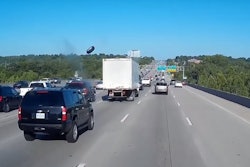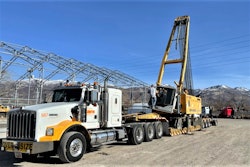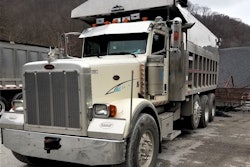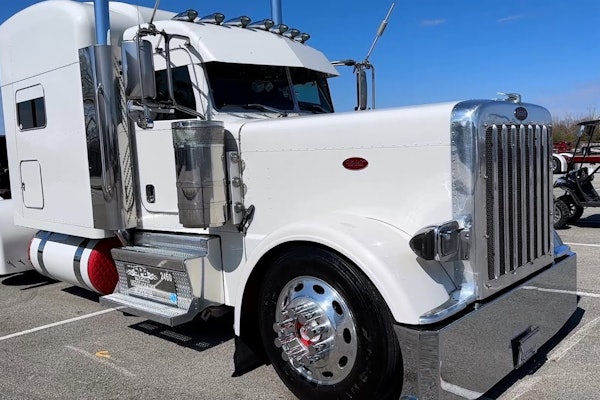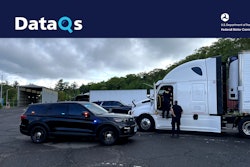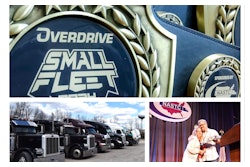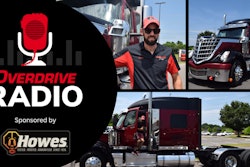In former owner-operator Scott Grenerth's case, it wasn't just a wheel but rather a tandem pair on his Utility flatbed. It was a little more than 10 years ago, and Grenerth made what he clearly saw in the aftermath as a critical mistake. On a fairly typical run South down I-65 from his Midwest home base he located a deal on fairly gently used tires at a shop near the Kentucky-Tennessee line, purchased the tires and had them installed. He continued South through Nashville without issue, connecting with I-24 and then on through the suburbs and past Murfreesboro, Tennessee.
Not far from the scale in Manchester, then, "all of a sudden I felt a little wiggle" in the trailer, yet it was a calm, sunny day. "I looked back" in the mirrors and "that’s when I see that the set of wheels had come off and were going off through the woods." Surveying the carnage in the aftermath, he likened the path of destruction to a tornado's, with the tandem pair toppling young trees -- "much bigger than just saplings," he said.
"There was just a stump where the tandems used to be" on the trailer axle, he said, "a stump of metal totally glowing white hot."
A mobile-service tech came out and retrieved the lost tandem pair. Inspecting the wheel, he noted oil dripping on the outer wheel and came to the conclusion the initiating cause was likely a leaky -- possibly nicked by the techs who did the tire swap up the road -- wheel seal. "It started leaking out and continued and continued and when there wasn’t enough lubricity left," Grenerth said, it was "metal on metal and white hot, and that’s what happened."

Grenerth spent a figure he can't recall exactly -- "definitely in the thousands," he said -- to repair the axle, ultimately, and sat at the truck stop where the service pros were headquartered for about a week as the shop attempted unsuccessfully to find an intact used trailer axle. There were no doubt "economic consequences" for his then young business, which had gotten its start just a year or two earlier in late 2008.
There's a new technology developed by LWS, Inc., out of Woodbridge, Ontario, Canada, that is designed specifically to address those kinds of dramatic failures specifically for commercial fleets. Markus Hess is President of the company and had a hand in developing the technology behind its namesake, which stands for Loose Wheel Sensors. Hess noted that about a fourth of all wheel-off incidents are a result of excessive heat of the type that Grenerth experienced those years ago. Most of the rest, he said, can be blamed on loose lug nuts.
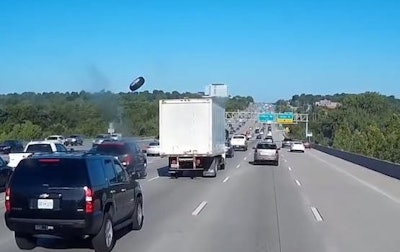 Wheel-off incidents aren't limited to heavy-duty truck-trailer combinations, but of course -- Thomas Ivie caught this one from an auto on his dashcam back in 2016. The tire flew through the air to, fortunately, catch just his front driver-side bumper.
Wheel-off incidents aren't limited to heavy-duty truck-trailer combinations, but of course -- Thomas Ivie caught this one from an auto on his dashcam back in 2016. The tire flew through the air to, fortunately, catch just his front driver-side bumper.
The LWS sensors, small gaskets fitted on the studs and between the wheel and the lug nuts themselves, are designed to detect both extreme heat events and gradual loosening of lug nuts.
The system includes five sensors on each outer wheel in a tandem pair -- under every other lugnut on any given wheel, Hess said. "You take off every second lug nut and slip the ring" sensor on the stud, then "put the lug nuts back on." When you tighten them to 450-500 lb.-ft. of torque, each sensor is then activated to communicate to a beacon mounted on the front of the trailer, powered by the electric connection to the trailer itself. The sensors measure temperature as well as the clamping force holding the wheel in place. When that force drops, or heat rises above 175 degrees Fahrenheit, Hess said, warning indicators flash on the beacon that will tell you just what the problem is (red lights for heat, other colors in one, two, three, or four flashes to indicate the particular problem tandem position on the trailer). This LWS-produced video outlines some of the basics of the system.
LWS's Robert Kimsto notes that the central beacon "can interface quite easily" with telematics systems owner-ops and fleets may have in place, delivering alerts not only into the cab but to "whoever you've set up" to receive them in the back office -- shop and safety personnel, for instance.
Costs in U.S. dollars Hess pegs at $125 per wheel, $600 to do a full trailer. The technology would work on the tractor as well, though the company has to date focused on trailers given well-known trailer-pool maintenance issues in drop-hook programs, identified by independent Overdrive readers recently as the most significant among drawbacks of hauling in power-only operations.
Grenerth's owned trailer was repaired at the time of his disastrous wheels-off mishap quite well. "I never had a problem again with that trailer," he said, tires included. Yeah, he learned his lesson. Outside of the occasional nail in a tire, every bit of tire work he ever had done thereafter was performed at a regular shop that came recommended by a fellow owner-operator in the Louisville area. A recap plant the shop used was nearby, and he lauded their work recapping his own casings, contrary to "all the times you hear people say, 'I’ll never use recaps' -- go to your regular dealer, plan it out, make sure it’s your casing you’re getting back," he recommended to anyone looking for a way to get the most out of their tires. "That way you know it’s been taken care of."
In a sense, he was lucky with his wheels-off disaster -- lucky that the incident occurred where it did and not 60 miles north at the junction of I-24 and I-40. "I can’t think of the carnage" that might have occurred had it happened "anywhere in that area" in Nashville. As for the LWS product, if its heat-sensing capability can deliver notification well "before the imminent failure – even if damage would have been done," something like that, he felt, could easily "save someone’s life."
He recalled an incident when he was a kid riding with his father in Miami behind a tow truck pulling a Volkswagen Beetle -- one of the wheels on the Beetle came off and collided with a car dealership along the highway, destroying four cars and crashing through the plate glass into the dealership itself. These are "not the kinds of things we'd wish on anyone," he said.





